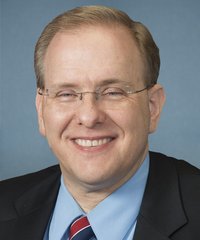
Congressman Jim Langevin (LAN'-jih-vin) is a senior member of the House Armed Services Committee, on which he chairs the Cyber, Innovative Technologies, and Information Systems Subcommittee and serves on the Subcommittees on Seapower and Projection Forces and Strategic Forces. He is a senior member of the Committee on Homeland Security and serves on its Subcommittees on Intelligence & Counterterrorism and Cybersecurity, Infrastructure Protection, & Innovation.
Langevin was one of four legislators appointed to serve on the Cyberspace Solarium Commission
, and he co-founded the Congressional Cybersecurity Caucus, which he still co-chairs, to increase awareness around the need for stronger cybersecurity. A national leader on securing our nation’s technology infrastructure against cyber threats, Langevin has authored or co-authored dozens of pieces of cybersecurity legislation, including most recently the National Cyber Director Act.
As a former member of the House Budget Committee, I am keenly aware that we cannot keep borrowing our way to a better future. We must continue to take decisive action to reduce our federal deficit. However, I also believe there is a role for government in making investments to create growth and ensure economic security. We are still feeling the lingering effects of the Great Recession, and Rhode Islanders are looking for a government that lives within its means while investing in its people. I pledge to continue to work towards both of those goals.
The two-year budget deal reached in December 2015 (Bipartisan Budget Act) was a breakthrough in a difficult fiscal and political environment. The agreement provided the budget framework to roll back some of the most harmful cuts imposed by sequestration. Specifically, it provided $80 billion in sequestration relief over two years - $50 billion in Fiscal Year (FY) 2016 and $30 billion in FY2017, divided equally between defense and non-defense discretionary spending.
Unfortunately, the budgeting process has become increasingly acrimonious. Last year, House Republicans declined to even hold a hearing on President Obama's Fiscal Year 2017 budget request – the first time such a hearing has not been held since 1975. The path to a Fiscal Year 2018 budget has been similarly rocky. Congress received a proposed budget from President Trump in May 2017, but has not passed a budget resolution before tackling appropriations bills – once again putting our agencies in jeopardy of sequestration. We must put politics aside and address our fiscal challenges.
We must also honor the debts we have previously incurred, decisions which impact the nation’s statutory debt limit. I do not believe in playing political games with the full faith and credit of the United States. The impacts of defaulting on our sovereign debt – or even suggesting we might – could have a disastrous impact on the underlying trust that holds our economy together. While I believe that we must address government debt, the time to do so is before we spend money, not when the bill comes due.
The Fiscal Year 2018 budget blueprint proposed by President Trump is deeply troubling. In the name of short-term spending cuts, his budget proposal cynically attacks numerous federal agencies. At a time when too many Americans are still unemployed or underemployed, the President is seeking to eviscerate job training and workforce development initiatives. His budget eliminates funding that helps people heat their homes and find affordable housing – literally leaving them out in the cold. These are not mere luxuries, but programs that make meaningful differences in the lives of Rhode Islanders.
Our budgets reflect our values and our priorities. We must continue to prioritize immediate investments in education, infrastructure, biomedical research and clean energy that will strengthen our country while seeking a balanced approach to deficit reduction over the long term . As we work in a bipartisan fashion to create a fiscal framework for our country, we must be sure we do not turn our back on these priorities. While I review the annual funding bills to attempt to weed out excessive spending and waste, I will oppose cuts to the services we rely on to keep our country afloat.
The United States has not had comprehensive tax reform since 1986. We are long overdue for a simplification of our tax code and for comprehensive reform that ensures our tax incentives align with America’s priorities. Unfortunately, the proposal most recently put forward by Republicans primarily benefits the wealthy and large corporations, while providing mere crumbs to the middle-class and small businesses. What’s more, it does so by creating a massive hole in the federal budget, which will add an estimated $1.7 trillion to our national debt. I remain conscious of any legislative activity that would increase our federal deficit, and I strongly believe that any tax reform must not increase our debt or overly burden middle- and lower-income Rhode Islanders. Congress has a responsibility to create an equitable tax system that responsibly funds vital government programs and contributes to the economic growth of all Americans. It is also imperative that tax reform be bipartisan if it is to be successful. I look forward to working with leaders from both parties to reach a compromise that will make our tax code far less complicated and incentivize investment in American families and businesses.